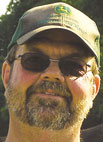 Ask Wes and Ame Hunter of Providence Farm in Seymour, Mo., how they ended up farming for a living, and they will tell you that “it just kind of came together.” The Hunters have always had a longtime interest in alternative farming and knowing where their food came from, and the quality of their food; around the time they started their family, they decided to make the jump to begin pursuing the lifestyle they dreamed of. Today, Wes, Ame, and their three children, Addison, Benjamin and Nathaniel, are proud to make their living off of their family farm. “We do this because we think it’s the right thing to do,” said Wes.
Ask Wes and Ame Hunter of Providence Farm in Seymour, Mo., how they ended up farming for a living, and they will tell you that “it just kind of came together.” The Hunters have always had a longtime interest in alternative farming and knowing where their food came from, and the quality of their food; around the time they started their family, they decided to make the jump to begin pursuing the lifestyle they dreamed of. Today, Wes, Ame, and their three children, Addison, Benjamin and Nathaniel, are proud to make their living off of their family farm. “We do this because we think it’s the right thing to do,” said Wes.
The Hunters purchased Providence Farm in 2011, and moved in about a year later. The acreage, house and barn have a rich history – the farm was originally owned by a prominent Seymour family, the McElwains; the house was built in the early 1900s, and the barn, complete with refurbished milking stanchions, was built in 1937. Wes still uses the barn and the stanchions to milk his cows.
Wes and Ame raise only heritage breeds of livestock on their land; Dexter and Jersey cattle, Cheviot sheep, Mulefoot hogs, and numerous breeds of chickens, turkeys and ducks grace the pastures and pond at Providence Farm. “We had in interest in rare breeds and things that are unique,” said Wes. The Hunters like the genetic diversity of heritage breeds, along with the fact that continuing to raise them annually improves the breeding stock of those varieties. Wes also noted that raising heritage livestock can also be a big marketing advantage – “It’s a niche we can fill.”
Providence Farm sells their trademark ‘Milk and Meadow’ Rose Veal (Wes and Ame’s veal calves are raised on pasture alongside their momma cows, not separated from them like conventional veal calves – this gives the veal from Providence Farms a deep rosy color), along with pastured pork products, whole chickens, ducks and turkeys, farm fresh eggs and lamb. The Hunters’ implement management intensive grazing practices that include moving their cattle daily during the peak grass season using portable electric fencing, and animals like the chickens and the hogs are fed locally sourced non-GMO feed. Wes and Ame market their products primarily through the Farmers Market of the Ozarks in Springfield, Mo.; some restaurants and specialty stores also carry their goods.
The Hunters believe very strongly that people need to be educated on the source and quality of the food they eat. “How you spend your food dollars matters,” Wes emphasized. Making the choice to eat local and to choose product from farms and ranches that raise their crops and livestock responsibly ensures that “getting what you pay for” can be a good thing. And the Hunters speak from experience – Ame cooks all of their meals from scratch, using their own meat, eggs and milk, and they grow a garden for vegetables.
The lifestyle that Wes and Ame lead at Providence Farm is not just good for the customers that buy their products, but for their family as well. “The kids can be out on the farm,” Ame said. She stressed the importance of having both parents at home, and the family unit working together as a whole to keep the farm going. Farming alternatively and making a living at it takes sacrifice – the Hunters have had to learn what you can do without – but the payoff in the end is a better quality living for everyone involved.
In the future, Wes and Ame plan to produce more fresh milk for their customers and to expand their veal market, as well as continuing to gradually build up their farm. They also hope to encourage others to pursue an alternative style of living and therefore, a better quality of life for their families. “Just do it,” Ame advised cheerfully.







